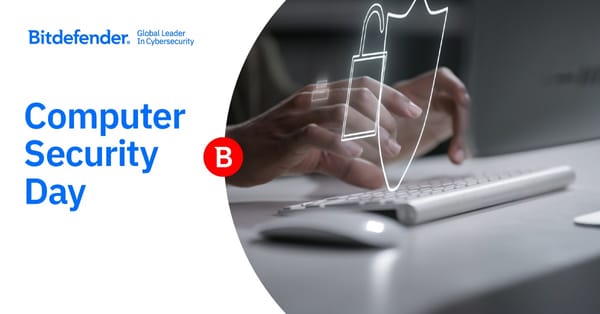Celebrate Data Privacy Day by taking control of your data and safeguarding your identity!

Every day we trust companies to keep our information safe or we carelessly flaunt information online without taking into consideration the consequences of our actions.
Personal information is so valuable that there are businesses who make billions of dollars from collecting, analyzing and selling user data. And we’re not counting the underground activities of cybercrooks who can’t wait for the next unprotected database or unmindful user.
This is why on Jan. 28 we are reminded of the importance of privacy and keeping personal data safe.
Data Privacy Day is an international effort to empower digital citizens to take control of their privacy and safeguard personal data in a connected era where we continuously disclose information via e-commerce and banking platforms, social media, streaming apps and even wearable devices.
Why is personal information so valuable?
Data sustains the digital world we live in today. It is used to create user profiles across all the platforms we use and devices and enables the delivery of profitable marketing campaigns and more. Moreover, personal data does not lose its value outside the advertising space. It’s also a precious commodity for cybercriminals, who thrive off the digital traces of users to inflict physical, financial and emotional harm.
From high-profile cyberattacks and data breaches that corrupt the digital space to leaky databases and irresponsible disclosure of information, it’s become imperative for users to understand that digital lives are not protected by default and take matters into their own hands to protect their personal information and identities.
Data protection day, an opportunity to set the standards for individual data protection and best practices to improve your privacy.
We frequently worry about the negative fallouts of data breaches, oversharing information and online negligence.
Given that the new year begins with setting personal resolutions, why not set one that can define the way you control, manage and protect the bits and pieces of your personal data scattered all over the web.
Your privacy-awareness journey doesn’t need to be complicated, we’re here to help you in creating a reliable mindset of digital privacy throughout the year.
Here’s what you can do to protect your online privacy and data
- Know your rights – Get to know the privacy laws where you live. This can help you understand the data collection processes of an organization and allow you to control how your information is used, or even request for your data to be deleted (in some cases).
- Find and delete old online accounts you no longer use – all public-facing information in accounts you signed for long ago can be exploited by threat actors and increase the risk of data theft and fraud. You should take your time in finding dormant accounts to limit privacy risks.
- Protect your account with smart passwords – While we hope you don’t consider ‘P@ssword’ and ‘123456789’ secure, many people around the world do. Please keep in mind that proper password security means having at least 12 characters that include numbers, special characters and lower and uppercase letters. Never use your name, address and phone number in the passwords. Make your passwords unique passphrases only you know and use dedicated tools such as password manager to keep them safe.
- Clear your browser cookies and cache – Cookies track your every move online, including browsing history, IP addresses and more. Regularly clearing cookies from your browser, especially for platforms you don’t visit regularly. This can help you avoid potential security risks, such as cookie hijacking.
- Check your privacy settings across all of your online accounts, apps and social media platforms – It’s important to take your time to properly manage the privacy settings on your digital platforms to safeguard against snoops, impersonators, hackers and digital stalkers alike. By tweaking the privacy settings on social media websites for example, you can control who sees your information available on your profile. What may seem like harmless information to you is a goldmine for fraudsters, so it’s important to not leave your email address, phone number and any identifiable info visible. We also recommend keeping friends lists private and not allowing strangers to freely message you.
- Use two-factor authentication (2FA) and multi-factor authentication (MFA) whenever possible to secure your online accounts from potential hacks and misuse by cybercriminals who get their hands on your credentials whether via a data breach, leak or phishing attempt.
- Never leave your devices unattended in public and use a privacy screen for your laptop or computer. To safeguard personal information and sensitive data found on your devices, never leave them unattended on a chair or restaurant table. Always keep devices password-protected and with you when travelling. A computer privacy screen can also protect your privacy when working from a café or in a crowded room or space such as an airport, making it exceedingly difficult for others to see what’s on your screen, and it prevents shoulder surfing by protecting your sensitive information from prying eyes.
- Limit the information you share online – social media profiles offer treasure troves of data to malicious actors. We cannot stress enough that you should never willingly share sensitive info online, whether it’s your home address, phone number, pictures of your ID, check-ins with the exact location, your plans, salary, workplace, your medical history, relationship problems, or legal issues. It gives digital miscreants the necessary motivation to successfully target you.
- Never use public Wi-Fi for banking transactions. Public Wi-Fi is an immense privacy and security risk, especially if you use it to log into sensitive accounts. Internet traffic on public Wi-Fi networks is unsecure and allows any knowledgeable individual to easily intercept the data, including your personal information. If you do need to connect to such a network, use a VPN to protect your internet traffic and prevent snoops from stealing your info or compromising your accounts. On top of that, the VPN will further strengthen your privacy when surfing the web, as it encrypts all your traffic and even prevents online tracking and profiling.
- Use a comprehensive security solution - Bitdefender security solutions are built with privacy and security by design to provide you with award-winning protection against all kinds of digital threats. From malware and ransomware protection to anti-phishing and anti-fraud technologies to safeguard your data and money, we’ve also meticulously included additional privacy-protections such as webcam and microphone protection, a dedicated browser for secure banking and shopping, privacy firewall, a handy file shredder and much more.
You’ve got the power to control your privacy and take ownership of the digital you with Bitdefender Digital Identity Protection
This Data Privacy Day you can embark on an empowering experience with our identity protection service that helps you discover the extent of your digital footprint. You can immediately find out what the internet knows about you and discover old accounts you no longer use), stay on top of data breaches and leaks with 24/7 dark web monitoring, social media impersonation checks and much more.
“Every day, you expose your digital identity more than your real-world identity. We are committed to continue to fight against identity threats in 2024 improving our services with new fraud scenarios and new sources of threat intelligence” - Marius MALAIAS - Principal Product Manager, Identity Protection.
We’ll soon be launching a new and improved version of Digital Identity Protection that will further benefit your knowledge about online privacy and identity.
Some of the main areas of focus include:
- Reminders about services that store your data and that you are not using anymore
- A new and improved Identity Protection Score that will give you a better understanding of your risks
- An effortless way to delete data stored and processed by a serviced provider who was involved in a data breach
There’s no more staying in the dark, not if you know what to do in case of a breach or the steps you need to take to remove your data or accounts from the databases of businesses you interact with.
Stay tuned for more updates on our blog!
tags
Author
Alina is a history buff passionate about cybersecurity and anything sci-fi, advocating Bitdefender technologies and solutions. She spends most of her time between her two feline friends and traveling.
View all postsRight now Top posts
Outpacing Cyberthreats: Bitdefender Together with Scuderia Ferrari HP in 2025
March 12, 2025
Streamjacking Scams On YouTube Leverage CS2 Pro Player Championships to Defraud Gamers
February 20, 2025
How to Identify and Protect Yourself from Gaming Laptop Scams
February 11, 2025
Your Device ‘Fingerprint’ Will Go to Advertisers Starting February 2025
December 24, 2024
FOLLOW US ON SOCIAL MEDIA
You might also like
Bookmarks







